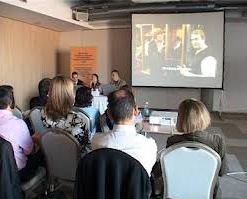Date: 19 October 2012
Region: Belgrade, Serbia
By Milica Pesic

 Though the Serbian equality and human rights legislation has improved in general, there is still a hate speech towards marginalized groups, which occasionally escalates and which needs to be confronted promptly and strongly by the Serbian political and legal authorities.
Though the Serbian equality and human rights legislation has improved in general, there is still a hate speech towards marginalized groups, which occasionally escalates and which needs to be confronted promptly and strongly by the Serbian political and legal authorities.
This is how the head of the EU Delegation in Serbia, Vincent Degert, qualified the current situation in the country when greeting the participants of the first ever international conference on media and equality organised by the country’s Commissioner for Protection of Equality.
Commenting on the recent football match between Serbian and English teams Under 21’s, Ambassador Degert said the atmosphere at the match was racist. He was insisting ’this kind of events should be not happening’, but if they do, media need to expose it. He also encouarged journalists to bring ’positive stories’ from this field.
 Mrs Nevena Petrusic, Serbia’s Commissioner for Protection of Equality, praised the improvement in the legal field too. But, ‘they are only good wishes if not applied’, said Petrusic.
Mrs Nevena Petrusic, Serbia’s Commissioner for Protection of Equality, praised the improvement in the legal field too. But, ‘they are only good wishes if not applied’, said Petrusic.
The President of the Serbian Parliament and the Vice-President of the Serbian Government agreed with the statements.
The participants, leading editors and reporters, mainly from Serbia and the neighbouring countries were more critical of the media role in exposing discrimination and their power to bring any positive changes.
“Without clarifying media ownership, we can not move much further neither in fighting corruption, one of the main challenges, nor we can expose strongly discrimination”, said Vukasin Obradovic, the President of the Indenpendent Association of Serbian Journalists, whose presentation focused on ethical and professional standards in reporting on Gay Pride, recently banned by the Serbian authorities.
Sue Caro, former BBC Diversity Expert who currently teaches at the MA Course Media and Diversity, jointly set up by Media Diversity Institute and University of Westminster, talked about the BBC’s Approach to Diversity. “Not all BBC policies in this field are yet working properly”, said Caro.
Milica Pesic, MDI Executive Director, listed ten reasons to embrace diversity, from legal to cultural.
“It seems that in Serbia crime has ethnicity only when committed by Roma or other non-Serbs, as if the major ethnic group never does anything bad”, says Pesic.
“Racism is not taken yet in this society seriously enough. While the articles and comments about the recent England-Serbia football match appeared in first minutes and pages of the UK media, in Serbia they are still only in the sport sections of the media. MDI started working in this region immediately after the wars, in 1997, when the wounds and patriotic media were still very loud. After we finished our biggest programme in SEE, ‘Reporting the Ethnic and other Minorities’, 2003-2006, during which period we did media content monitoring, it seemed that the hate speech was the past. But, we were wrong. It’s back and neither journalists unions nor the authorities are responding aggressively enough to it”, said Pesic.